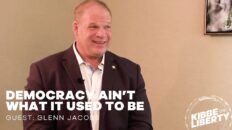The movie industry is as good a place as any to take stock of the national mood, and if this year is anything to go by, we have plenty to worry about. I’m thinking in particular of three films, each wildly successful either in terms of critical acclaim or box office results, that share a similar theme: hostility towards the rich.
First came Jordan Peele’s widely acclaimed horror film Us, in which a shadow world of miserable doppelgängers serves as a thinly veiled allegory for class warfare. The have-nots in the film are represented as virtual zombies, condemned to a life of servitude and emulation of their counterparts on surface, living happy and carefree lives.
Next came the bafflingly controversial Joker. While critics apparently misunderstood the message of the film, somehow interpreting it as a rallying cry for the alt-right, it was pretty clear that the wealthy Wayne family, along with Wall Street types and talk show hosts, were intended to be the movie’s actual villains, condemned to death for their insensitivity towards the less fortunate.
Then, there’s the sleeper Korean hit everyone’s talking about, Parasite, in which an impoverished family insinuates themselves onto the payroll of a wealthy couple. Portrayed as dim and out of touch, the elites celebrate in over-the-top garden parties while those who depend on them—living literally underground, it might be added—are nearly drowned in a flood of sewer water. Subtle.
These three films, all heavily praised, have the common elements of rich people as undeserving, lucky, exploitive, and sometimes downright cruel, and they all culminate in bursts of cathartic violence against the upper the classes. And the crowd goes wild.
Movies, of course, are only part of the broader culture, and this is a theme that has been building for some time. To take one particularly extreme example, serious people running for President want to eliminate billionaires from existence.
Meanwhile, the younger generation is laboring under the factually incorrect belief that, not only do they have it worse than their Baby Boomer parents, but they will always have it worse, being denied fundamental opportunities for success. This is exemplified in the infamous tweet by Rep. Alexandria Ocasio-Cortez claiming that she’s never experienced America prosperity. The mood is not unique to her. Suicide rates, alcoholism, and drug abuse are all up among young people, indicating a national feeling of hopelessness and despair.
Of course, this is all absurd. By any objective measure, we are living in the richest country, in the richest time, in all of human history.
The economy is in good shape, unemployment is down, and technological improvement makes life better and more convenient by the day. I know that, in this age of sensitivity, we’re supposed to say “your feelings are valid” to everything, but sorry guys, your feelings are empirically invalid.
So what’s going on here? Where is this feeling coming from? If we’re doing better than ever, why is everyone convinced we’re doing worse? I wish I had the answer, but it could be attributed to a number of factors. First, political rhetoric has gotten pretty ridiculous, and due to social media and the 24-hour news cycle, Americans seem to be paying more attention than ever to politics. Both parties have an incentive to convince you that your life is bad and that the reason it’s bad is because of the other party. Cable news has an incentive to shock you with horror stories and cautionary tales in order to get ratings. Both sides of the ideological spectrum perform this Orwellian trick, albeit in slightly different ways.
While alarmists on the right create scapegoats out of immigrants and imaginary foreign enemies, those on the left want to convince you that the rich are responsible for all your problems. They are the ones destroying the planet with fossil fuels, mistreating workers, and hoarding all the money for themselves. Without the rich, we are told, there would be more money to go around for the rest of us, Of course, this represents a fundamental misunderstanding of economics. Rich people don’t hoard money, they spend and invest it, meaning it helps support small businesses, scientific research, technological innovation, and workers whose salaries come from people rich enough to afford them. Furthermore, most rich people get rich by providing a service that people like and want to pay for. Jeff Bezos didn’t make his money stealing old women’s purses, he made it by creating a service everyone uses and loves. That hardly makes him a Batman villain.
Just because people are wrong, however, doesn’t mean they can be ignored. From a social and historical perspective, we should be very, very concerned that people are feeling such animosity towards the wealthy. Not that the wealthy need protecting; they are perfectly capable of looking after themselves, but the attitude I have chosen to call “plutophobia”—fear of the rich—is one that has always led to very bad outcomes for everyone.
Revolutions in places like Russia, France, Cuba, and many other countries have largely been motivated by hatred for the upper classes. Apart from being unspeakably violent, these conflicts resulted in the creation of new governments that, far from leveling the playing field, created mass poverty, death, and suffering among the people they were supposed to help. Envy, scapegoating, and fear mongering made the lives of poor people immeasurably worse, not better. In fact, the only thing that has ever reliably lifted people out of poverty is the promise of becoming wealthy under a system of competition and markets.
So how do we as Americans avoid a violent confrontation like the ones above, and prevent ourselves from repeating the bloody history of revolutionary envy? It would help for a start to gain some perspective. Stop watching cable news and start reading some history books, or better yet, Steven Pinker’s books on how violence, ignorance, disease, and poverty have declined over the years. A simple guide to what daily life was like in the Victorian period, or even the 1950s, can give you a whole new appreciation for the wonders of indoor plumbing and refrigeration.
Perhaps most important is to stop expecting other people to be responsible for your happiness or success. These are not things that can be given to you by governments, by your parents, or by anyone else. If you want them, you have to take them, and you will feel better for having done so. In the end, you have no one to blame for your failures but yourself. Passing the buck to faceless billionaires may seem easier in the short term, but in the end it only makes things worse. Remember, when no one is rich, everyone is poor.














Add comment